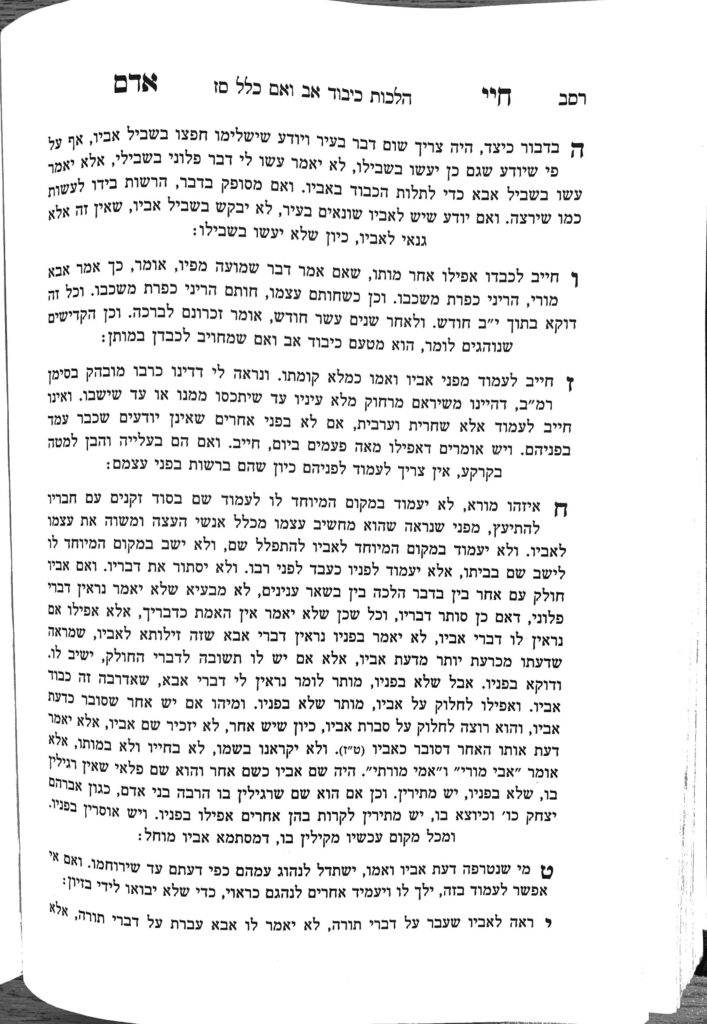We are continuing in siman 7, where the Chayei Adam is discussing the chiyuv to stand up for one’s parents. The Chayei Adam qualifies that, although one must stand up for their parents, they only need to stand twice per day, once in the morning and once in the evening. However, if after having already stood up once, others are present who aren’t aware that the child had already stood up for the parent that day, the child must stand up again.
The Chayei Adam brings a second opinion that every time the parent passes by, a child must stand up (see more below).
The Chayei Adam writes that if a parent is in a different reshus than the child, the child does not need to stand up. For example, if the parent is upstairs and the child is downstairs, even if they can see each other, the child does not need to stand up. The Gemara learns that the pasuk which teaches us the chiyuv of kimah (standing up) qualifies the kimah with the concept of hiddur. This qualification teaches us that the chiyuv kimah is only when there is hiddur. When the parent is in a different reshus, it is not clear that the child is standing up specifically for the parent, so there is no chiyuv to stand up.
The Chayei Adam mentioned two opinions regarding how often one must stand for their parents. The same opinions are brought regarding standing for a rav muvhak. Regarding a rav muvhak, the Rema writes that the minhag is in accordance with the opinion that one only needs to stand twice per day (unless others present will misinterpret, as we learned above). However, the Shulchan Aruch writes that one must stand every single time. The Sephardim follow the Shulchan Aruch, and the Ashkenazim follow the Rema. These psakim, and the minhag which to follow, apply to parents as well.
A rav muvhak is allowed to be mochel on his kavod so that talmidim do not have to stand up for him. The same is true for parents. However, the concept of hiddur still applies. Hiddur, in this context, means to indicate in some way that the talmid or child would like to rise, but were told to refrain. This indication is fulfilled through a slight rise, without fully standing up.
Mechila for this purpose is obtained by the parent or rav stating that they do not want the child or talmid to rise for them. However, it must be clear from the statement that the mechila granted was not temporary or one-time, but was meant on a permanent basis.
This halacha of standing up for one’s parents seems to have fallen by the wayside. Some poskim have assumed that since it is no longer practiced, there is an implied mechila from parents. However, it is still better to receive explicit mechila from one’s parents rather than rely on this assumption.
Summary
- The chiyuv to stand up for a parent begins when the parent comes within the eyesight of the child. The child must remain standing until the parent is out of eyesight, or until the parent has reached their seat.
- A child only needs to stand twice per day, once in the morning and once in the evening. However, if after having already stood up once, others are present who aren’t aware that the child had already stood up for the parent that day,, the child must stand up again.
- If the parent is in a different reshus, the child does not need to stand up.
- Parents can be mochel on the need to stand up, but it is still appropriate to rise slightly.
- Nowadays, where standing up for parents is not practiced, the poskim suggest that there is an implied mechila. Nevertheless, it is proper to receive explicit mechila from them.



